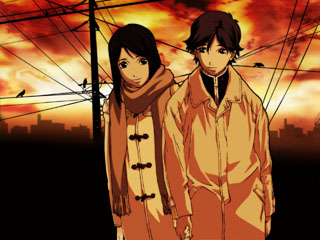I came across an interesting passage about the origin of the word é»„æ˜ (tasogare) today. It’s not enough for a proper lesson chapter and I have no idea what topic to dump it under, so I’ve decided to create a brand new section: Japanese Titbits! How exactly does this differ from Katamari, I have no idea. Just accept it. So anyway…
Japanese Titbit #1
According to WWWJDIC, The word é»„æ˜ (tasogare) is defined as “dusk” or “twilight”. It’s a word that you don’t see much in normal usage outside of poems and songs. The normal word used to refer to evening is 夕方 (yuugata).
Some examples of it being used: .hack//Legend Of The Twilight is known in Japanese as 「.hack//黄æ˜ã®è…•è¼ªä¼èª¬ã€ (.hack//tasogare no udewa densetsu). See-Saw has a song titled 「黄æ˜ã®æµ·ã€ (tasogare no umi) in its Dream Field album. I looove that song.

The origin of tasogare is pretty interesting.
Long ago, there were no street lights and evening was a time where you couldn’t really make out the faces of other people. It was bright enough that people didn’t need to carry lanterns or lamps but just dark enough to mask any details.
ãŸããŒã‚Œ
黄æ˜
tasogare
And when you couldn’t tell who was heading your way, you would ask 「誰ãã€å½¼ã¯ï¼Ÿã€ “taso, kare wa?“, an archaic expression that means 「誰ã ã‚ã‚Œã¯ã€ “dare da are wa” or “Who’s that person?”.
ãŸã€€ã€€ã€€ã€€ã€€ã€€ã€€ã‹ã‚Œã€€ã€€ã€€ã€€
誰ãå½¼ã¯
taso kare wa
Somehow along the way, “taso kare” got turned into one word and became “tasogare“, which is then used to refer to evening. The kanji é»„æ˜ (which also means evening in Chinese) was added on later.
ãŸãã‹ã‚Œ → ãŸããŒã‚Œ
Just like 今日 (kyou), 明日 (ashita) and æµ´è¡£ (yukata), é»„æ˜ is a kanji compound that is being used for its meaning rather than its reading. (Edited for factual error)
The reading of tasogare should technically be “koukon” following the on-readings of 黄 and æ˜, but it takes on the reading of “tasogare” because of the similar meaning. Therefore, “tasogare” is neither the kun-reading nor the on-reading.
(Editied for additional information)
I forgot to add that tasogare conveys a feeling of loneliness and melancholy when used in songs and poems today. Listen to See-Saw’s “Tasogare no Umi” and you’ll see what I mean.

Very nice piece. Looking forward to more of those in the future! :-)
That etymology is somewhat reminiscent of the (less poetic) French word “vasistasâ€, a small panel one can open in a closed door to take a peek outside. This comes from the German phrase “Was ist das?†(what’s that?).
As an aside, doesn’t this makes é»„æ˜ a special reading (熟å—訓) rather than an ateji? (As well as kyou, etc. Another funny one is 五月è¿ã„ urusai). I think ateji are the opposite: kanji used for their phonetic value, notably in non-Asian loanwords before the use of katakana was widespread, but also in words like å¯¿å¸ sushi.
Yes, my mistake.
It should be:
黄æ˜, if it were read as an ateji, would be read as “koukon“.
I have slapped myself thoroughly and corrected the mistake. Gah.
I think this was one of the Japanese quirks I read up on an e-book concerning how some of the kanji has readings that are neither on- or kun- readings, nor they were read based on their actual meanings.
It’s quite interesting how the language can be both having a sense of rules and decorum, yet at the same time can have so many exceptions that made the previous rules useless. Just my 2 cents worth.
Happy to find this website. The birth of the word was really interesting. I’m also looking forward to more of those in the future. :)
P.S. The Lyrics are really good. I’ve found ones that I couldn’t find before. Thanks a lot!
lol, this was in the past year O-level Japanese paper wasn’t it?
Great article and great explanation. It always amazes me how words come to be. Especially when most people (including the native speakers) usually don’t know how they came to be that way.
Pingback: تاسوقاري (黄æ˜) | عن وقت الشÙÙ‚ ÙÙŠ الأعمال اليابانية | مدونة ندى